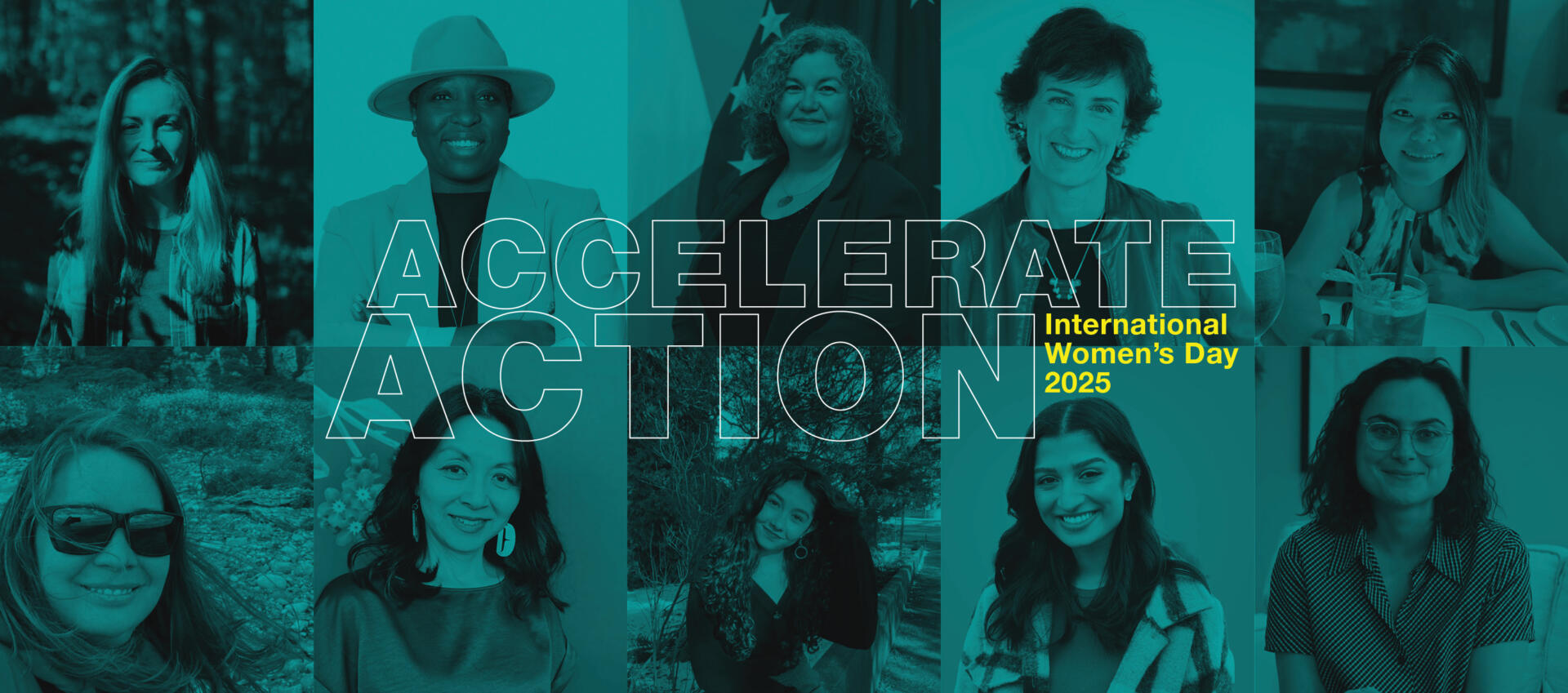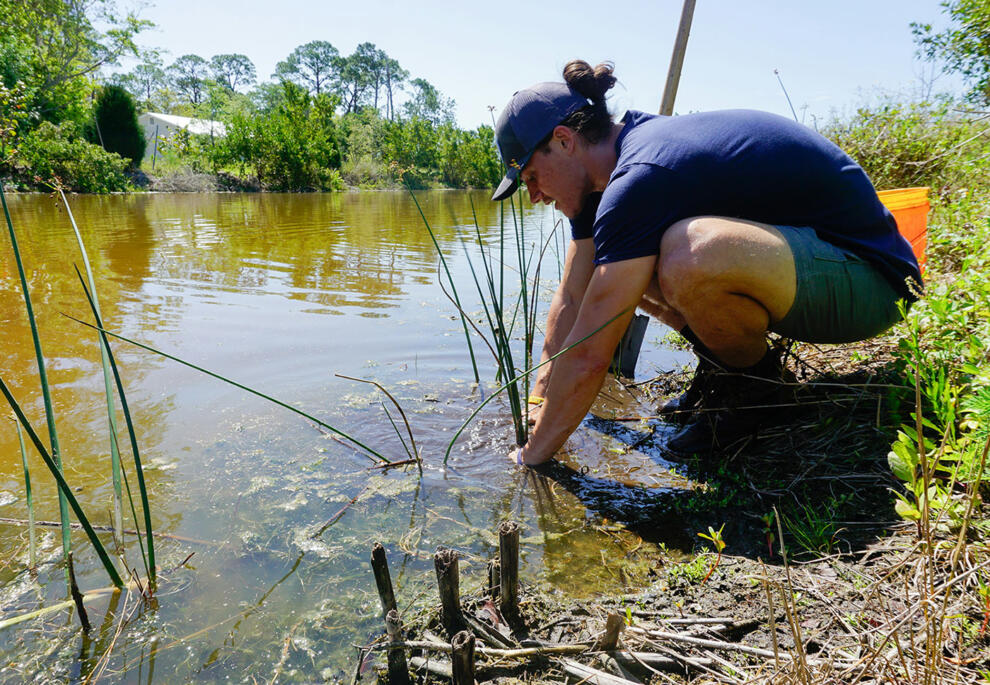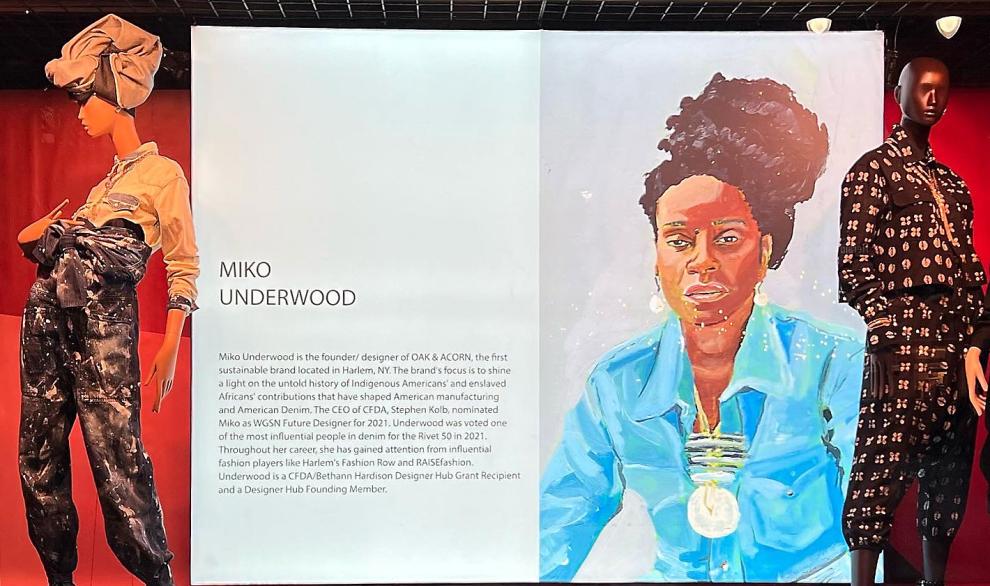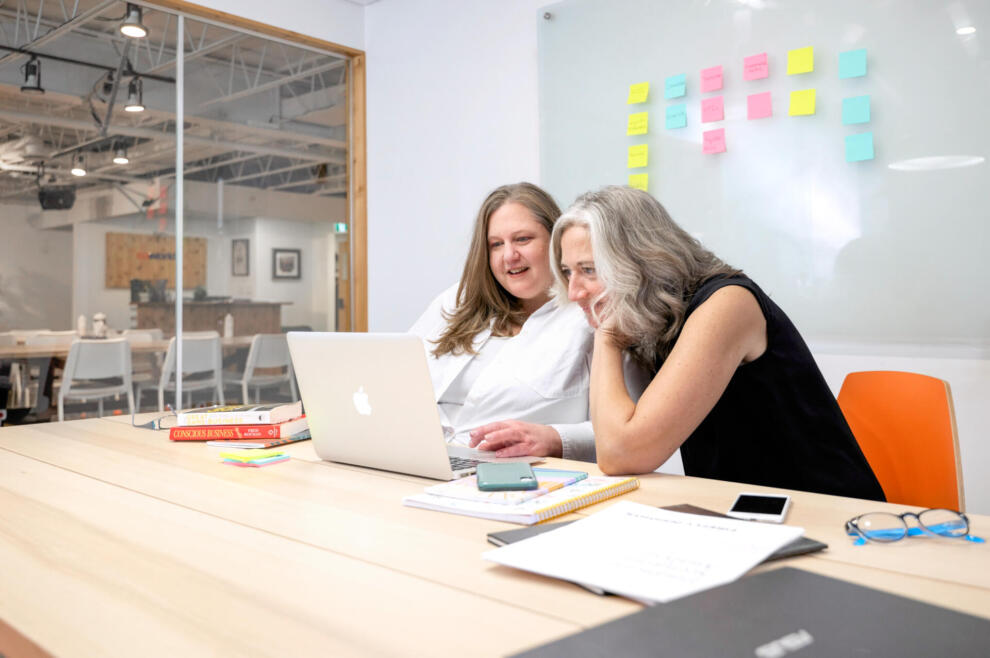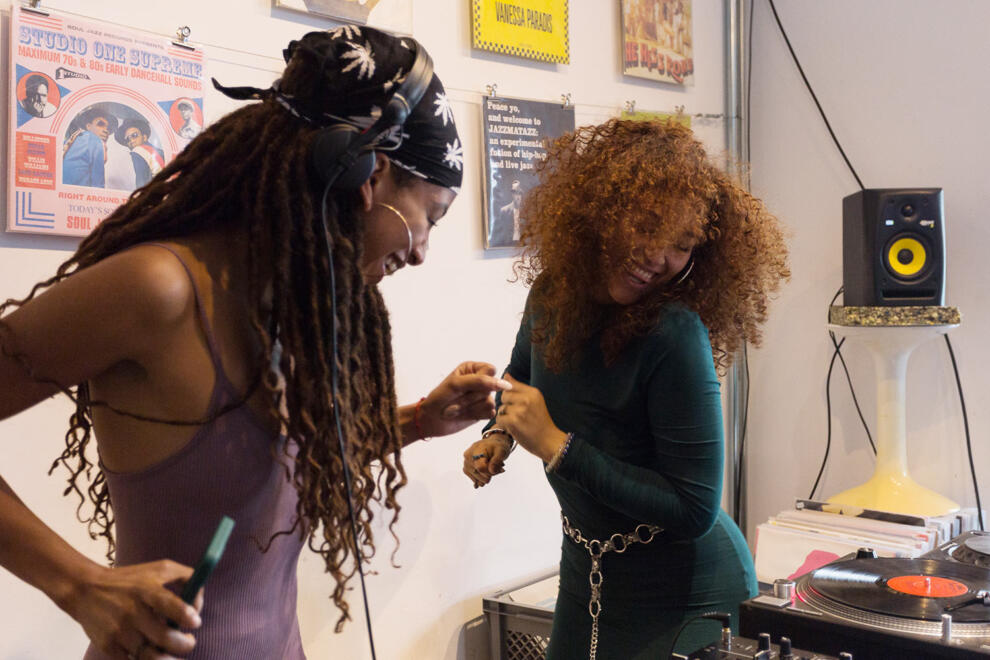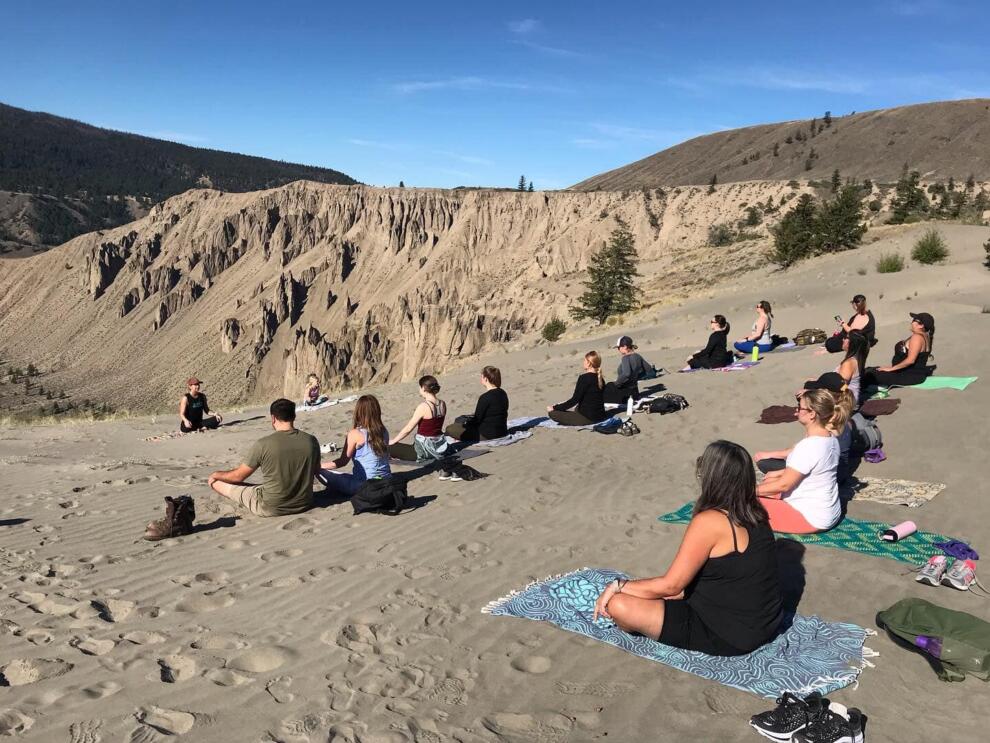Women Accelerating Action this International Women’s Day
In 2025, International Women’s Day carries a powerful message: Accelerate Action. This theme isn’t just about big speeches, powerful platforms or global policies—it’s about everyday changemakers making things happen, despite barriers.
To celebrate and amplify, we’re shining a light on women in our communities who are rolling up their sleeves and working towards progress, for gender equality, children’s education, food equity, climate change, financial empowerment and more. These are the leaders, activists, entrepreneurs, and advocates who are pushing for real change, whether it’s fighting for better workplace policies, living feminist values, or creating opportunities for the next generation.
Progress doesn’t just happen—it’s driven by people who take action. These women are leading the way and inspiring others as they go. Follow them, celebrate them, join them.

Amanda Watson, PhD, Assistant Professor in the Department of Sociology and Anthropology at Simon Fraser University, President of SFU’s Academic Women.
What is unique about the female approach to leadership, activism and driving change? Women learn early that we need to collaborate and communicate to get things done. We tend to observe and listen until we are confident that we have something to contribute to a conversation. We are more likely than men to mentor and uplift each other. We are less likely to take credit for someone else’s work. Women also experience sexism and misogyny and are more likely than men to experience poverty and violence. We are more likely to be caregivers for children, elderly people, and people with disabilities. And women are a diverse group. Depending on our race, class, sexuality, and other identities that shape how we move through the world, we have a more or less comprehensive understanding of how systems work for and against people, and what needs to change.
The IWD 2025 campaign theme is ‘Accelerate Action.’ How are you activating this theme in your life and work? Whether this is coming with age and mid-career stage, or whether the current political moment of rising sexism and racism in Canada and the US is too extreme to ignore, I feel less inclined to censor myself and more inclined to act. Last year, I started a new service role at Simon Fraser University (SFU) as President of an advocacy organization called Academic Women. I spent the first six months of the role listening to members and thinking about how to continue the important legacy of past presidents, especially as we see misogynist, transphobic, and racist rhetoric mobilized by alt-right political leaders in the US and Canada, including at universities. It is a scary time, but this brings clarity. For example, at SFU, any project or mandate that includes the word “equity” is under attack by a vocal group on campus. As this attack accelerates, we need to accelerate the work we have been doing for decades, and with fewer resources. I’m not scared. I’m motivated by the people around me who show up and fight in these moments. In the Academic Women group, we’re meeting frequently to share resources and build community. I’m also relieved that we might be able to leave what has been called “corporate” or “neoliberal” or “white” feminism behind, because it is clearer than it may have been to many 10-20 years ago that corporations and their cause marketing will not save us. So many people are fighting for the basic right to survive and thrive in sustainable communities, without border violence, labour exploitation, or ecological grief, and we are loving each other through it, feeding each other, and we are not going anywhere.
What advice would you give to young girls or women who want to create positive change towards gender equity? Start small to build your local community and don’t be afraid to speak your concerns in that community. This may sound vague, but even as an enthusiastic graduate student in feminist and gender studies, I sometimes held back in activist circles and classrooms for fear of saying the wrong thing. We don’t have time for that perfectionism in activism. It’s not helpful. It doesn’t allow for real friendship and allyship if someone is holding back because they are anxious about using the right language. Language evolves through these very exchanges in our local communities. Listen, learn, and take a risk. Join a book club, a knitting circle, a fitness group, student government, a choir, a fan club for a local sports team, a movie club, a dog park advocacy group, something that connects you to people in your community who you might not otherwise meet. And make it something that re-connects you to yourself when you need it because… You’re going to need it!
What is your call to action? I tell my kids and students: everyone has something to offer. Connect to a practice that connects you to yourself and to others. You’ll find that something to offer.
Check out my Substack: https://substack.com/@drwatson
And find me on Bluesky: @spindrwatson.bsky.social

Isabela Bonnevera, doctoral researcher at the Barcelona Lab for Urban Environmental Science and Sustainability and co-founder of Feminist Food Journal
What is unique about the female approach to leadership, activism and driving change? I don’t believe there is a uniquely “female” approach to leadership but I do believe in a feminist approach to leadership, which is accessible to people of all genders. My research lab, the Barcelona Lab for Urban Environmental Science and Sustainability (BCNUEJ), considers itself a feminist workplace and centers values of care, peer learning, and personal development. My Feminist Food Journal co-founder, Zoë Johnson, and I very much try to take this approach with our own business as well: for us, feminist leadership in the social sector means first and foremost, caring for ourselves, each other, our writers, and our extended community. Fighting for positive change can be tiring and often financially thankless work, and we’re always conscious of the age-old adage that “you can’t pour from an empty cup.” At Feminist Food Journal, we prioritize understanding the myriad life commitments and challenges that can get in the way of an “efficient” workflow — and recognize that caring for others outside of professional responsibilities is, indeed, the work that sustains life on earth as we know it.
The IWD 2025 campaign theme is ‘Accelerate Action.’ How are you activating this theme in your life and work? With the rise of right-wing political forces and their efforts to silence academics and activists working toward gender equity, I feel more committed to my work than ever. In the spirit of accelerating action, there are two things I want to be more intentional about this year. One is checking in more frequently on my community — in hostile political environments, the most potent action we can take is to tend to, uplift, and celebrate each other. How are my friends and colleagues doing? What actions can we take to remind ourselves that together, we have power?
Another is to emphasize quick wins. Practically, what I mean by this is that in the face of time and energy constraints, doing something, even if it’s not as grandiose or meticulously sculpted as you would like, is better than doing nothing. Say we’re interested in featuring a woman trailblazer in sustainable food systems in Feminist Food Journal, but we don’t have the capacity to interview them on our podcast — we can still share their name and bio with links to where readers can learn more about their work. In a nutshell, I want to work on letting go of perfection and focus instead on small and powerful actions.
What advice would you give to young girls or women who want to create positive change towards gender equity? Working on gender equity sometimes feels tough — like you’re not making a difference in the face of so much inequity and injustice. One thing that can help with those feelings of powerlessness is to identify your niche. What gender equity issues are you most passionate about? Focusing on those issues, and where your skills can make a difference, can give you the motivation and the stamina to make impactful change. For me, this niche is food systems, and while I stay informed on what’s going on in other sectors, I know that I have other brilliant colleagues working toward gender equity in those areas. We can’t be everywhere at once, so sustainable change happens by honing our skills and expertise while creating networks with other change-makers working toward the world we want to see.
What is your call to action? Be brave, and think small. For example, political moves to dismantle programs that promote intersectional justice and gender equity become normalized bit by bit, as people adjust to new and less equitable realities (and we operate within a neoliberal system that pressures us to adjust to whatever reality we are handed, by siphoning away the time we have to organize and advocate for change collectively). We can’t “learn to live” with this new status quo, and no matter where you live now is the time to prioritize small, frequent actions that disrupt the normalization of inequity.
Can you write to your political representative to tell them what changes you want to see? Can you push back against a family member or colleague saying something you disagree with? Can you uplift and share the work of a changemaker you admire? Even something as simple as organizing a dinner for your friends to come together and share your successes and struggles can have an impact by allowing people to fill their cups before returning to the fight. And beyond individual actions, now is the time to think about joining a broader movement advocating for change you believe in, and how this movement links up with others. All our struggles for a fairer world — the fight for gender equity, trans rights, racial justice, the climate, and more — are deeply interlinked, and looking at any in a vacuum only leads to band-aid solutions.
Connect with me on LinkedIn at https://www.linkedin.com/in/isabela-bonnevera/.
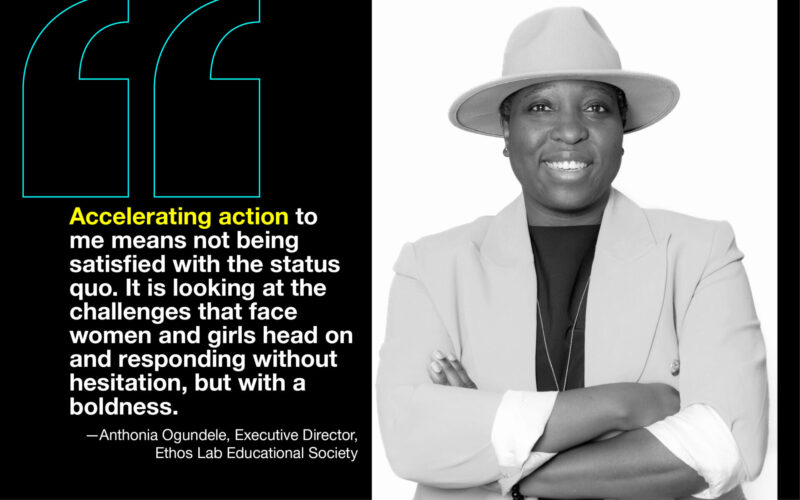
Anthonia Ogundele, Executive Director, Ethos Lab Educational Society
What is unique about the female approach to leadership, activism and driving change? That’s an interesting question as I have never gendered my approach to leadership, however how I might respond is that I move in this world with a resolve and audacity to create the change that I want to see in the world. This is with intention. I want other women and girls to know that they can do this as well.
The IWD 2025 campaign theme is ‘Accelerate Action.’ How are you activating this theme in your life and work? Accelerating action to me means not being satisfied with the status quo. It is looking at the challenges that face women and girls head on and responding without hesitation, but with a boldness.
What advice would you give to young girls or women who want to create positive change towards gender equity? Women and Girls have nothing more to do than live as their authentic selves. While there are inequities that persist we need to recognize that the most radical action we can take is to unapologetically be yourself.
What is your call to action? The woman’s movement is not immune to lateral violence and the discrimination that impacts the common cause of greater equity- regardless of gender. Now more than ever it is important to support each other across culture, class, backgrounds, abilities etc. Listen, learn, love and lead!
Directly support Ethos Lab striving to bring greater equity within the innovation sector. Give here: https://vancitycf.fcsuite.com/erp/donate/create/fund?funit_id=1267
Connect with me on Linkedin https://www.linkedin.com/in/anthonia-ogundele/ and follow Ethos Lab @ethos.lab
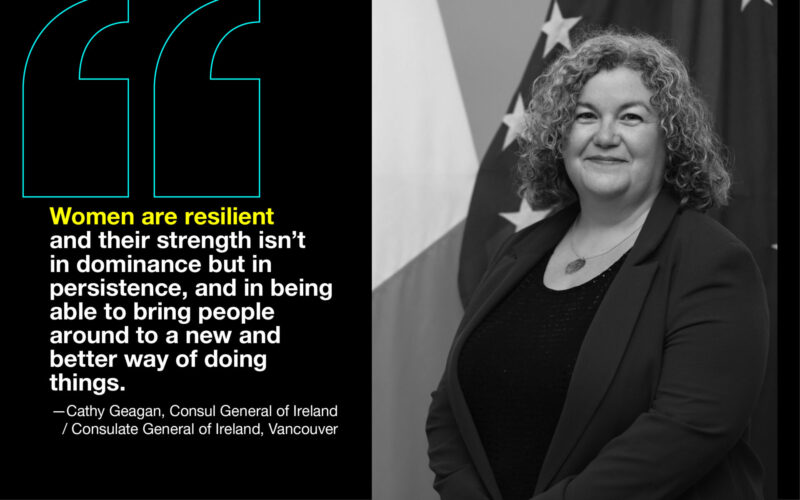
Cathy Geagan, Consul General of Ireland / Consulate General of Ireland, Vancouver
What is unique about the female approach to leadership, activism and driving change? The best women leaders I have known, and what I try to replicate, is leading by connection. No leader can achieve anything without their team, and while it is my role as a leader to keep high standards and see the big picture I do so without losing sight of the individuals within it. Meaningful change does not come about by force, but from driving progress though determination and understanding. Women are resilient and their strength isn’t in dominance but in persistence, and in being able to bring people around to a new and better way of doing things. Elon Musk’s “move fast and break things” approach to driving change is the antithesis of this. Women leaders place more emphasis on collaboration, shared decision making, and consensus building. They create spaces where diverse voices are heard, and fostering inclusivity and diversity is the best possible way to improve the productivity of your workplace. You can still move fast – but you don’t have to break things.
The IWD 2025 campaign theme is ‘Accelerate Action.’ How are you activating this theme in your life and work? Raising awareness about the realities faced by women and girls, and supporting female-led businesses and grassroots organisations, is very important to me in both my life and work. A cornerstone of this in our public diplomacy work in Western Canada is the celebration of Brigid’s Day (1st February) which we celebrate with a series of events celebrating the achievements and contributions of women to society. Something very special happens when you bring women together, it creates a palpable energy and sense of possibility. In these current times of war, violence, forced migration and economic hardship, environmental crisis, and endemic global violence against women and girls, and the acute climate and environmental crisis, we must all raise our voices to safeguard the hard won rights of women and girls and to strive for a safer, more loving world for all. Change is possible. As recently as 52 years ago there was a marriage bar in Ireland whereby a woman in civil or public service roles had to resign on getting married, and today over 50% of Ireland’s diplomatic missions are led by women.
What advice would you give to young girls or women who want to create positive change towards gender equity? Know your worth and act accordingly – no one can make you feel inferior without your consent, and “no” is a complete sentence. It is very important to believe in yourself, which is something women and girls are often conditioned not to do as we are bombarded with impossible standards and expectations through society and the media from a young age. Something I find helpful is to remember to deal with emotions the way the Irish language teaches us to. For example, in Irish we do not say “I am sad” but, “Tá brón orm” meaning “Sadness is upon me”. This is a temporary feeling and situation, and there is a you that is independent of the externalities that you are currently reacting to. Get to know that core you – and then always speak of her and to her like you would talk to a friend. There is only one you, and so bringing your authentic self to the world is very powerful. It may not always work out, but when you do make connections they are real and fulfilling.
What is your call to action? Believe in yourself and use your voice – speak the truth even if your voice shakes.
Find me on LinkedIn, https://www.linkedin.com/in/cathy-geagan/ or follow the Consulate General of Ireland Vancouver @IrlinVancouver on all platforms.
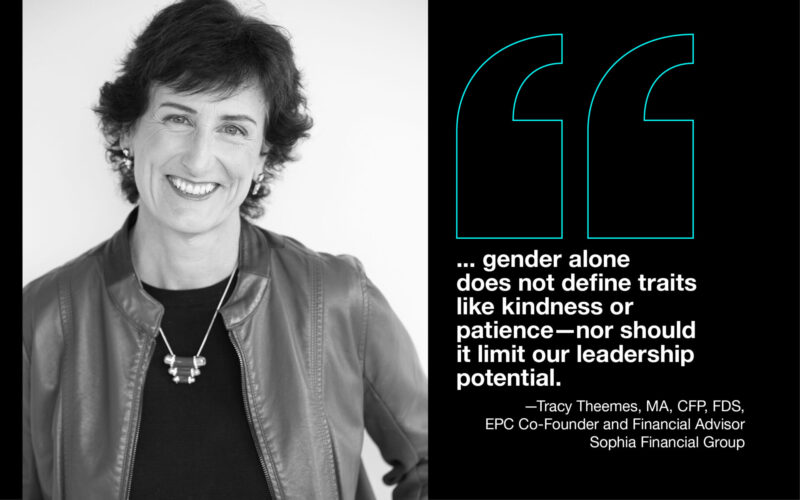
Tracy Theemes, MA, CFP, FDS, EPC Co-Founder and Financial Advisor Sophia Financial Group
What is unique about the female approach to leadership, activism and driving change? Women’s approaches to leadership are deeply shaped by a history where our influence was often confined to the domestic sphere or as second-in-command, operating behind the scenes. This legacy informs our perspective today, offering a more nuanced and complex view of power, money, and leadership than traditional masculine models. We women continue to navigate a world that often fails to reflect our lived realities. Through experience, we understand that not everything of value can be quantified in financial terms or justified by a business case. While gender alone does not define traits like kindness or patience—nor should it limit our leadership potential—the shared experience of systemic discrimination and historical disempowerment undeniably shapes how women lead and drive change.
The IWD 2025 campaign theme is Accelerate Action. How are you activating this theme in your life and work? I am protecting myself from negativity as much as possible. I ground myself in the values I hold dear, like compassion, justice, equality and kindness. I will not reduce myself to an agent of capitalism, but I will embrace my wealth and use it in service to others and their well-being. I operate from my own set of standards of how a good person behaves. In my business, Sophia Financial, we engage in a day per week of pro bono work. We offer free financial literacy classes. We assist those in our community who need our knowledge and professional guidance. We do this without thought to reward or recognition. We do what is right. Because it is right. And in this time in our collective history, I consider this an act of bravery and activism.
What advice would you give to young girls or women who want to create positive change towards gender equity? My advice: learn about money. Don’t see your career as something that stops at motherhood—see it as a means to support a family on your own and maintain financial independence for life. Stay aware of the subtle ways your economic power can be diminished. Pick up the bill on a first date! Fight for fair pay. Fight for the ability to pay. It’s harder than you might think. (For more, check out my TED Talk on who should buy dinner on a first date!)
What is your call to action? Build a strong, healthy, and empowered relationship with your finances. Money shouldn’t be the reason for your decisions, but it is the currency that makes things happen. Take control by aligning it with your values and needs. Read finance books, take courses, and skip the TikTok advice.
Connect with me at sophiafiancial.ca and https://www.linkedin.com/in/tracy-theemes/
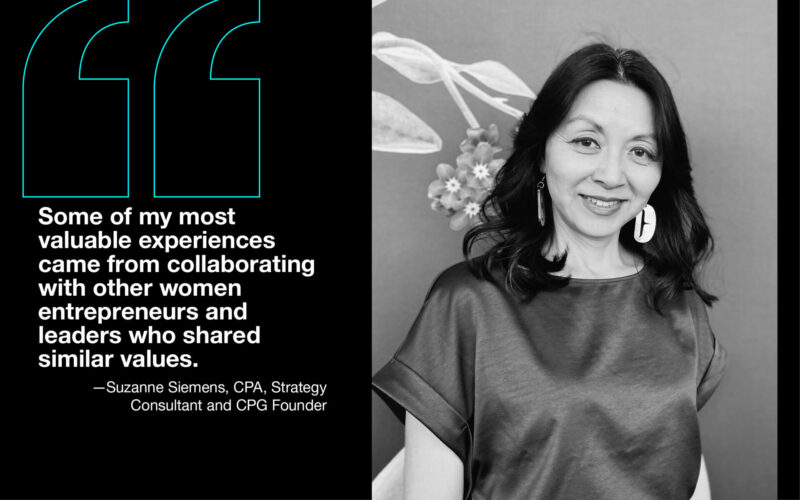
Suzanne Siemens, CPA, Strategy Consultant and CPG Founder
What is unique about the female approach to leadership, activism and driving change? Through my experience building Aisle and mentoring countless entrepreneurs, I’ve observed that many women leaders tend to approach change through a lens of collective impact and systems thinking. Rather than seeing business solely as a path to profit, we often view it as an opportunity to address an unmet need or drive some form of systemic change. At Aisle, we didn’t just create sustainable period products – we challenged stigma, advocated for policy changes and demonstrated how business can address both social and environmental challenges simultaneously. This intersectional approach to leadership recognizes that issues like gender equity, environmental sustainability, and social justice are deeply interconnected.
The IWD 2025 campaign theme is ‘Accelerate Action.’ How are you activating this theme in your life and work? For me, accelerating action means leveraging my decades of entrepreneurial experience to amplify impact through mentorship and knowledge-sharing. After successfully exiting Aisle, I’ve chosen to focus on supporting the next generation of change-makers, particularly women and underrepresented entrepreneurs. I’m actively working with several organizations to share my insights about how to build and scale sustainable, values-driven businesses and organizations. Acceleration isn’t just about moving faster – it’s about creating deeper and multiple forms of impact on issues that matter the most.
What advice would you give to young girls or women who want to create positive change towards gender equity? Start where you are, with what you have, but think beyond your immediate sphere or traditional boundaries. When we started Aisle, our goal was to address the need for better period care, under a lens of sustainability. We then quickly realized our work could influence broader conversations about gender equity, environmental justice, and inclusive business practices. Don’t be afraid to challenge existing systems and narratives. Build networks of support – some of my most valuable experiences came from collaborating with other women entrepreneurs and leaders who shared similar values. Creating change isn’t always linear; sometimes the most significant impacts come from unexpected directions or take time to manifest and materialize.
What is your call to action? My call to action is threefold: First, to established business leaders – commit to mentoring and supporting women and under-represented entrepreneurs, particularly those working on social and environmental challenges. Second, to entrepreneurs – consider how your business model can address multiple forms of inequity simultaneously and how those solutions can tackle interconnected challenges. Finally, to everyone – recognize that we all have a role to play in challenging and transforming existing structures. Whether through your purchasing decisions, professional work or personal advocacy, look for ways to be an ally and support women-led initiatives that are creating positive change.
Connect with me on LinkedIn https://www.linkedin.com/in/suzannesiemens/
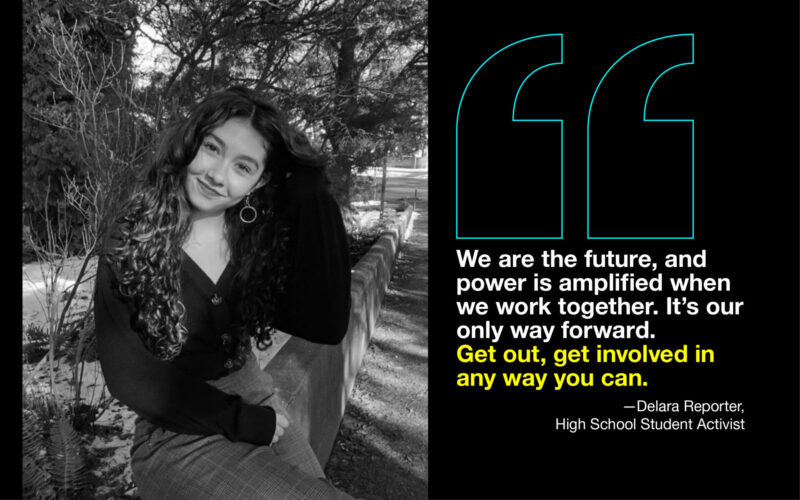
Delara Reporter, High School Student Activist
What is unique about the female approach to leadership, activism and driving change? Women are born into a system that is set against us. Any woman in search of equity is an activist, so when it comes to campaigning for other causes I find it comes naturally. When the drive and passion to lead change is woven into who I am as a person it’s easy to apply it to other causes.
The IWD 2025 campaign theme is ‘Accelerate Action.’ How are you activating this theme in your life and work? I strive to accelerate action in anything I do. Whether it’s helping out new initiatives, spreading word around the school, or giving a student perspective on how to plan events, action is the priority. By getting out there and bringing people together from outside and inside my school community I’m helping to accelerate the causes that matter most.
What advice would you give to young girls or women who want to create positive change? Get involved and don’t be afraid to get out of your comfort zone. Doing a speech in front of an entire protest was not something I envisioned for myself. It’s easily one of the scariest things I’ve done but I am so happy I did it. You always have to remember that you have people in your corner, and with their support and your drive you can do anything.
What is your call to action? We are the future, and power is amplified when we work together. It’s our only way forward. Get out, get involved in any way you can.
Follow @patchwork_vsb for info on a climate fashion show I’m co-organizing and designing for!
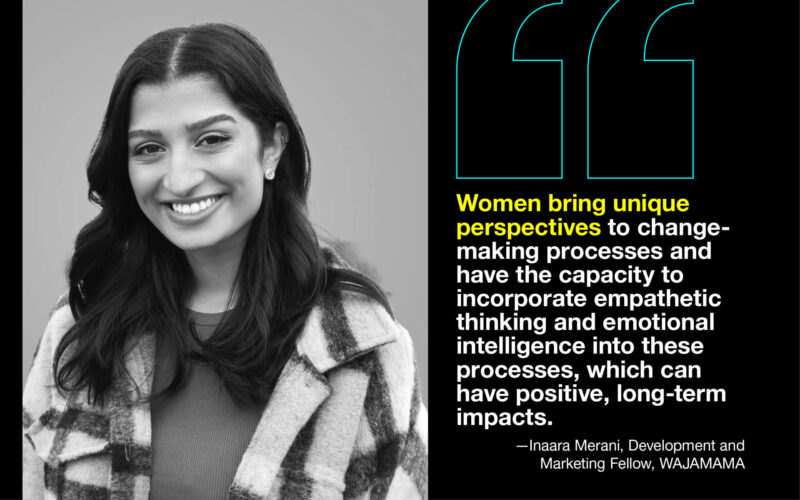
Inaara Merani, Development and Marketing Fellow, WAJAMAMA
What is unique about the female approach to leadership, activism, and driving change? When women are at the forefront of leadership, activism, and driving change, there are long-term, systemic impacts. Women bring unique perspectives to change-making processes and have the capacity to incorporate empathetic thinking and emotional intelligence into these processes, which can have positive, long-term impacts. Additionally, given the systemic barriers women face daily, we approach life with resilience and determination, not afraid to keep trying when we face obstacles.
The IWD 2025 campaign theme is ‘Accelerate Action.’ How are you activating this theme in your life and work? This year’s IWD theme of “Accelerating Action” is a call to action to address the systemic barriers that women face in their personal and professional lives. Through my work, I am activating this theme by amplifying stories of women and girls impacted by WAJAMAMA’s programs. As the Development and Marketing Fellow, I have the opportunity to share the organization’s progress on social media, through our monthly newsletters, and our annual and quarterly reports. Although I am not actively in the field delivering these programs, sharing stories about maternal healthcare and reproductive health education programs at WAJAMAMA.
I am an individual who believes that despite our ideological differences, discourse is the most powerful way forward. If we are willing to engage in conversations with individuals who may not have similar belief systems, not only will we learn from them but we will also be able to understand the problem differently. Being in the international development space, and particularly the women’s rights space, I frequently encounter individuals with different beliefs than my own. I actively engage in conversations not just to share my belief systems, but also to learn about how others perceive the same issues. Discourse is extremely powerful, and I will never say no to a conversation with someone, even if our perspectives are opposite.
What advice would you give to young girls or women who want to create positive change towards gender equity? No action is too small. Every step we take towards gender equity makes a difference. Whether you’re volunteering your time, spreading the message via conversation, social media, and/or protests, or simply reading up on important women’s rights issues, your contribution matters!
What is your call to action? My call to action is to continuously learn from women who are on the frontlines of movements. Living in Zanzibar, I have had the incredible opportunity to go into communities and learn firsthand from nurse-midwives who administer WAJAMAMA’s Group Care Model, mamas who participate in the program, and women from Zanzibar and mainland Tanzania who are spearheading community movements. I will continue to learn from them and ensure that my approach to activism is always rooted in contextualized knowledge and understanding.
Connect with me on LinkedIn
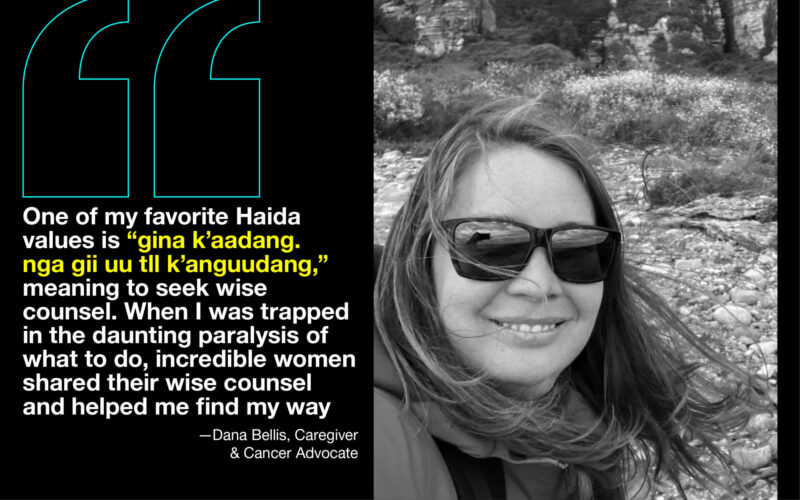
Dana Bellis, Caregiver & Cancer Advocate
My English name is Dana Bellis, and my Haida name is Jaad Gudangaa ‘laas, from the Yahgu Laanaas Raven Clan. My Haida name, gifted by my great aunt, means “happy lady”—what a gift of love for life! My Mom is Irish Canadian, and my father is Haida. I was raised bi-culturally on Haida Gwaii and am grateful for the cultural fluency my families have given me.
For the past year and a half, my Mom and I have navigated the waves of her cancer diagnosis and treatment. I’m grateful to live with her and support her in every way I can. As a Patient Partner Volunteer with the Canadian Cancer Society (CCS), I help drive cancer research and services forward.
At CCS, I serve as an evaluator on cancer research funding panels (fascination in action) and advise on granting and training programs that emphasize equity, diversity, inclusion, and accessibility (leveling up in action). Additionally, I am an Advisory Council Member on CCS’s BC Cancer Travel and Accommodation Services (CTAAS), where I focus on connecting BC residents with financial and accommodation support (help in action).
Between the lines of my professional and volunteer work, you can see my passion for driving strategic process design for exceptional implementation—helping local communities, organizations, and residents access transformative opportunities. Why? Because don’t we all need more time, money, and ease!
What is unique about the female approach to leadership, activism and driving change? Never underestimate the power of saying, “I don’t know, please help,” or “what the heck is going on?” in the presence of great women. Why do I say this? Because they likely already know you’re a little lost—and things move a lot faster when you admit it (giggle, giggle, giggle).
Life has been kind to me, connecting me with many female trailblazers who have shaped the world around us. They have generously shared their time, wisdom, and networks to support me when I felt uncertain or to catapult me to the next level. Their generosity strengthens us all—and history will remember it. I used to worry if I could ever give back—until I realized I was already walking and talking with other women in the same way I had been guided. Brazenly drinking coffee and sharing as the trailblazers who guide me, I found peace in reciprocity and paying it forward.
Perhaps what’s “unique” isn’t the interesting question, but rather “how” women drive leadership, activism, and change forward? How we lean into one another when we meet the edges of what we know, lighting the path ahead for us and those to come.
The IWD 2025 Campaign Theme: “Accelerate Action.” How are you activating this theme in your life and work? To me, action is about results. It begins with a clear-ish vision of where you’re headed and why—sketching out a rough idea of what success means for you, and how you want to feel along the way (anyone up for some escapades and a laugh?).
Now, let’s pause for an overly dramatic moment… 😊
This does not mean you need to have all the answers or a perfect plan. Because my gosh, where would the fun or trailblazing be in that? This year, I am delighted to bring the voice of Haida Gwaii to the global stage in the cancer community. Coming from the edge of the world is a unique experience and sharing that perspective with the leaders of the cancer community will help create ripples of positive change.
I’m over the moon to share that I’ve been selected as one of four Patient Advocates from Canada—co-sponsored by the CIHR Institute of Cancer Research and the American Association for Cancer Research (AACR)—to attend the AACR Scientist↔Survivor Program® (SSP) in Chicago this April. This amazing opportunity will allow me to train and network with over 23,000 leading cancer researchers and advocates worldwide (my hometown has around 1000 people!). I’ll be presenting a poster titled “Chemo at the Edge of the World: Caring for my Mom through Pancreatic Cancer on Haida Gwaii,” where I share my lived experience and highlight the needs of rural, remote, and Indigenous communities.
Participating in the SSP is my proactive way to expand my knowledge, grow my impact, and seek international advisory and evaluator opportunities in the cancer research community. This year, I’m also excited to serve on three cancer research funding panels, continue improving BC cancer services through CTAAS, and take the best possible care of my Mom and myself as we navigate her cancer journey together.
What advice would you give to young girls or women who want to create positive change? If it doesn’t light you up or bring you peace, then it’s a big old NO! Suffering needlessly doesn’t add value or make you noble—it only means you’re stuck in discomfort and stress. Find what lights you up, what brings you ease, and where you feel peace, purpose, and presence. When you discover those glimmers or fireworks, lean into them and build from there.
I have always appreciated when people share a peek into their “how.” One of my favorite Haida values is “gina k’aadang.nga gii uu tll k’anguudang,” meaning to seek wise counsel. When I was trapped in the daunting paralysis of what to do, incredible women shared their wise counsel and helped me find my way—they supported me when I felt lost and celebrated with me through my successes.
My wish for you is to remember to be perfectly you! We only have one of you, and we need you. Seek wise counsel to light new, creative paths forward, and share your own wisdom brazenly with others. Lastly, always celebrate your wins and lessons learned—regularly toast an espresso and cookie with those you hold dear. Celebrate the small and big escapades together—these moments build the legacy of who you are becoming.
What is your call to action? Get involved in a way that’s perfectly you—whether that means becoming a Patient Partner in cancer research, driving with the Canadian Cancer Wheels of Hope Program, or sharing your wisdom to illuminate our path forward. Every action matters in accelerating us onwards!
Help me amplify my impact in the cancer community by connecting me with international advisory and evaluator opportunities. Together, we can empower communities like Haida Gwaii by seamlessly linking local and global initiatives to spark transformative change!
Connect with me on LinkedIn at www.linkedin.com/in/danabellis
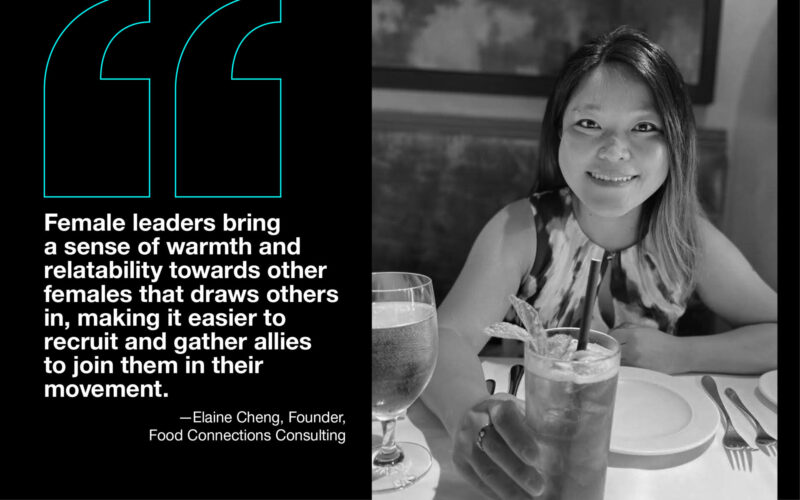
Elaine Cheng, Founder, Food Connections Consulting
What is unique about the female approach to leadership, activism and driving change? When a female shows leadership or exhibits power in activism, there seems to be a sense of underlying camaraderie amongst other women in support. Our unique approach to leadership may also be shaped by our underlying sense of nurture and compassion towards others. In my experience, female leaders bring a sense of warmth and relatability towards other females that draw others in, making it easier to recruit and gather allies to join them in their movement.
The IWD 2025 campaign theme is ‘Accelerate Action.’ How are you activating this theme in your life and work? I am quite passionate about my values, and one of them has to do with the reduction and redistribution of food waste, both on a large scale level and on the individual level. I had the privilege of kick starting a movement in Vancouver in 2025, bringing awareness to the issue of food waste in our city through a massive organized lunch event. We involved a diverse set of organizations, ranging from farms, to non profits, to restaurants, to students and kids to put together an event on zero dollars that can feed 5000 people. We allowed people to think outside the box and join in the movement to reflect on their relationship with food through the lens of food waste, scarcity, and abundance. Since then I’ve been a consultant and educator for restaurants, government, and schools in this space of food waste reduction and recovery. It’s been so encouraging empowering entrepreneurs in this space and seeing the movement grow as practices become standardized in our city.
What advice would you give to young girls or women who want to create positive change towards gender equity? Be your authentic self and help others be theirs as well. Pursue wholehearted connection and intentionally make others feel seen and valued.
What is your call to action? I have been loving the book, Unreasonable hospitality, by Will Guidara. There’s a quote in there that really resonates with my values. “People will forget what you do; they’ll forget what you said. But they will never forget how you made them feel.” My CTA is to be more intentional with each human interaction I come across, and see it as an opportunity to bless that individual in front of me.
Connect with me at https://www.food-connections.com/ or on LinkedIn https://www.linkedin.com/in/elaine-cheng-b5775159/
